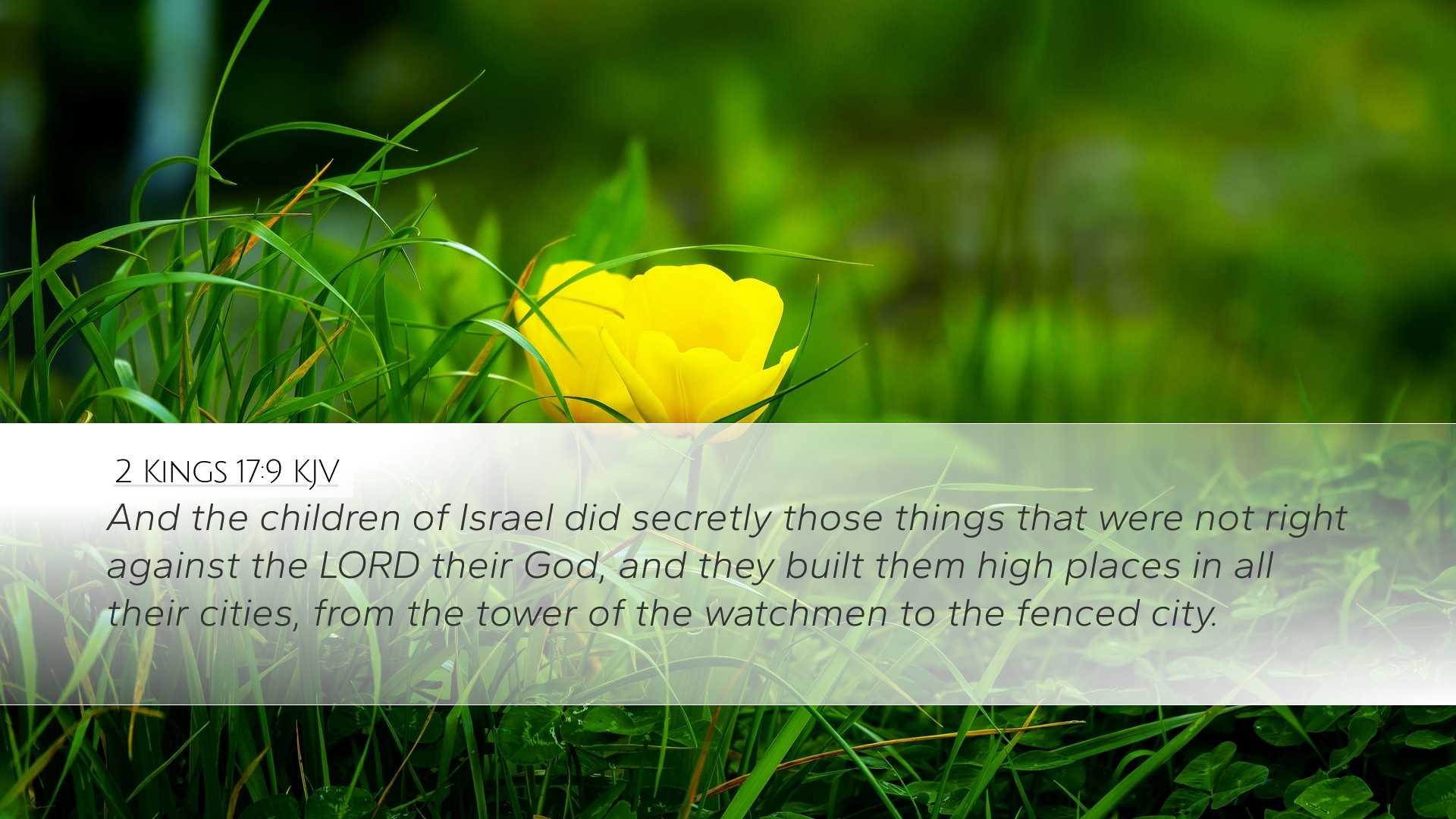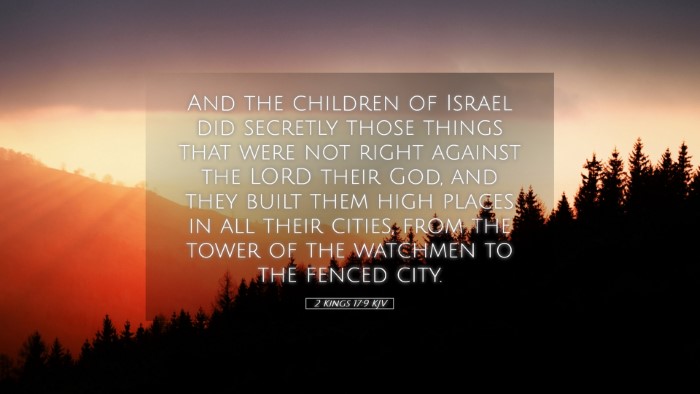Commentary on 2 Kings 17:9
Verse Context: The book of 2 Kings provides a historical account of the kings of Israel and Judah, as well as the events during the era leading to the Babylonian exile. Chapter 17 recounts the final days of the northern kingdom of Israel, focusing on the sins and disobedience that led to its downfall. The verse states:
“And the children of Israel did secretly those things that were not right against the LORD their God, and they built them high places in all their cities, from the tower of the watchmen to the fenced city.” - 2 Kings 17:9
Overview and Analysis
This verse encapsulates a crucial moment in Israel's history, marked by secret sin and idolatry. Each public act of worship was expected to align with the teachings of the LORD, yet the people engaged in clandestine practices that directly opposed God's commandments.
Insights from Public Domain Commentaries
Matthew Henry's Commentary
Matthew Henry emphasizes the hypocrisy of Israel’s behavior, noting how the children of Israel acted in secret. He writes, "They committed sin under the cover of darkness, thinking that no one would see them. This secretive sinfulness highlighted their disconnection from God and their conscious decision to choose rebellion over righteousness."
He further notes that the “high places” signify places of idol worship, which were set up in defiance of God’s command to worship only in the temple at Jerusalem. Henry asserts that the tower of the watchmen represents the heights of sin that Israel achieved, illustrating the people's failure to heed God's warnings.
Albert Barnes' Notes on the Whole Bible
Albert Barnes draws attention to the phrase “secretly,” suggesting that the Israelites were aware of their wrongdoing. He comments, "The deliberate choice to engage in these hidden acts demonstrates a profound spiritual blindness that led distinctively to their captive condition." Barnes interprets the high places as symbolic of Israel's departure from true worship, indicating that the people prioritized their desires over divine instruction.
He also relates the passage to the broader theme of Israel's social and spiritual decay, asserting, "Their public faith was stained by private infidelity; the outward show of religion did not match their inward reality."
Adam Clarke's Commentary
Adam Clarke elaborates on the construction of high places as acts of idolatry. He proposes that the high places served as "centers of worship for various Canaanite deities, revealing how the people mixed the worship of Yahweh with pagan practices." Clarke underscores that such actions were not only disobedient but also profoundly detrimental to the covenant community of Israel. He reflects on how these practices led to a weakened spiritual state and ultimately to Israel's downfall.
Theological Implications
The verse highlights key themes of disobedience, hypocrisy, and idolatry. The secret nature of Israel’s sins underlines a significant theological point: that God sees all, even the hidden motives and actions of the heart. This notion resonates throughout Scripture, calling believers to live in the light of Christ and to avoid the duplicity that characterized the Israelites.
- Disobedience: The actions of Israel reflect a conscious choice to turn away from the Lord's commandments. Their building of high places illustrates a rejection of the centrality of the temple and the worship of Yahweh.
- Hypocrisy: Engaging in worship practices that contradicted God’s law demonstrates a deep-seated hypocrisy. The people wanted to maintain the appearance of faith while indulging in secret sins.
- Idolatry: The high places symbolize a departure from exclusive worship of Yahweh and illustrate the dangers of syncretism, blending true worship with pagan influences.
Practical Applications
For pastors, students, theologians, and Bible scholars, 2 Kings 17:9 reminds us of the importance of integrity in our spiritual lives. It calls for self-examination regarding areas where we may be engaging in “secret sins” that contradict our public professed faith.
Areas for Reflection:
- Personal Integrity: Assess whether there are areas of your life where you may be knowingly participating in practices that are contrary to God’s will.
- Impact of Community Worship: Consider how community practices can sometimes reflect hidden deviations from authentic worship. Are our worship practices aligned with Scripture?
- Vigilance Against Idolatry: Reflect on modern-day idolatry and what “high places” exist in our lives or communities, which may distract from genuine devotion to God.
Conclusion
In summary, 2 Kings 17:9 provides a sobering reflection on the nature of sin and the tendency towards hypocrisy among God's people. By studying this passage alongside insights from the commentaries of Henry, Barnes, and Clarke, we gain a deeper understanding of the profound consequences of secret sin and the need for continual alignment with God's will. The lessons gleaned from this verse serve as an enduring call to faithfulness and truthfulness in our walk with the Lord.


